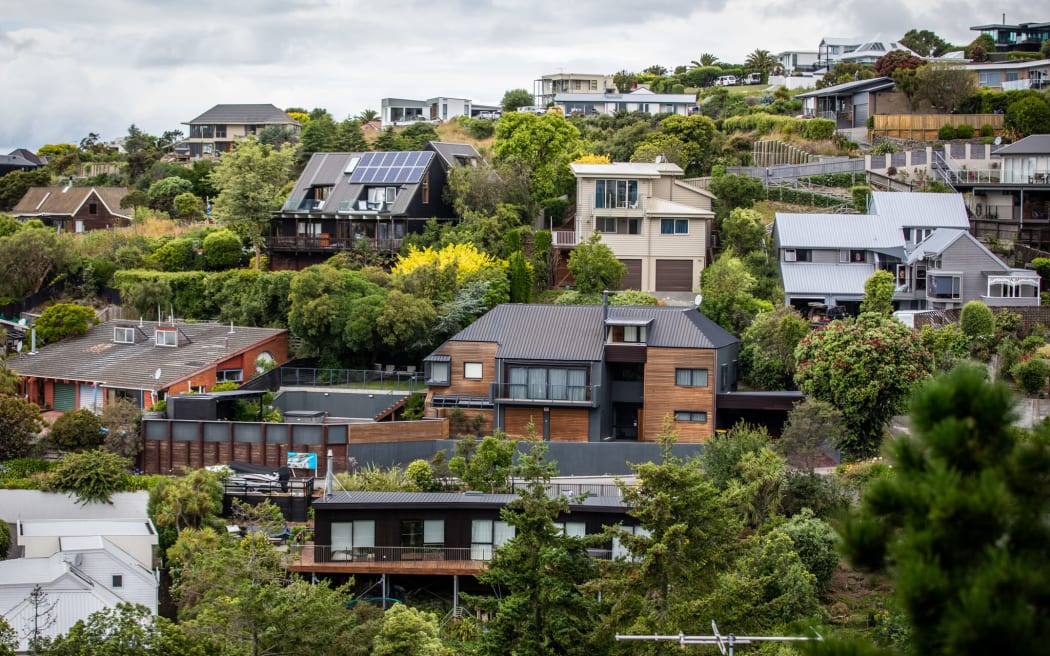
House prices are more affordable - but they're still not exactly cheap, a data firm says. Photo: RNZ / Nate McKinnon
House prices have returned to a more affordable level - but they're still not exactly cheap, data firm Cotality says.
It has released its latest housing affordability report.
Cotality chief property economist Kelvin Davidson said prices were still down about 17 percent on the peak.
The national value-to-income ratio of 7.5 is the lowest since mid-2019.
The time required to save a deposit had also reduced to 10 years, compared to almost 14 in 2021. It was now not far above the long-term average of 9.1.
At 10.5 and 11.3 years respectively, the time required to save a deposit in Auckland and Tauranga remained the highest of the main centres, although they had both fallen to multi-year lows and were more or less back down at their long-term averages.
Mortgage repayments on a typical house being bought now took up 44 percent of median household incomes, compared with a peak of 57 percent in 2022. They were at the lowest level since early 2021 and only 1 percentage point above the average since 2004.
"Servicing costs at or near their long-term average suggest that affordability is no longer the handbrake it was during the downturn," Davidson said.
"That doesn't mean housing is suddenly cheap, but it does mean buyers and existing borrowers are operating in conditions that are much more manageable than they were a few years ago.
"The last couple of years where house prices have come down and stayed flat and incomes have gone up a bit and interest rates have come down, they've all combined to improve affordability to its best point in five or six years."
Affordability improvements were most visible in Auckland, Tauranga and Wellington, where mortgage repayments were now sitting slightly below normal levels.
Tauranga is the least affordable of the main centres.
Hamilton and Christchurch had not experienced the same improvements in affordability, because values had not fallen as much.
Auckland now had a value-to-income ratio of 7.9, the lowest level in a decade, while Wellington sits at 6.4, back in line with its long-run average for the first time since 2016.
"Wellington is not suddenly a cheap market, but it is more affordable than it has been for many years," Davidson said.
He said the country's housing in general had returned to normality.
"The fact that key measures are now back at long-term norms in a number of key centres is a clear sign of how far conditions have adjusted, and helps to explain the renewed interest we are seeing from some buyer groups."
Davidson said the market was likely to remain subdued for a while, particularly if efforts to improve supply were successful.
"You do wonder if we're going to truly fix housing affordability, right now is probably as good an opportunity as we've got."
The picture was not as good for tenants.
Nationwide, rents were 28 percent of income, compared to a long-term average of 26 percent.
"Renting is still very challenging ... and of course there will be a lot of renters out there who are paying average rents but not necessarily earning average income. So for them, things are going to be even more stretched," Davidson said.
Auckland and Wellington were at roughly their historical levels but Hamilton, Christchurch and Dunedin were higher. Renters there were spending nearly 30 percent of their income on rent, at least three percentage points above normal.
Sign up for Ngā Pitopito Kōrero, a daily newsletter curated by our editors and delivered straight to your inbox every weekday.







